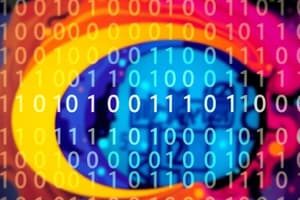Podcast
Questions and Answers
Which system do computers use for representing numbers?
Which system do computers use for representing numbers?
- Octal system
- Binary system (correct)
- Hexadecimal system
- Decimal system
What type of error occurs when a number is too large to be represented in the fixed number of digits?
What type of error occurs when a number is too large to be represented in the fixed number of digits?
- Underflow error
- Format error
- Overflow error (correct)
- Precision error
What happens when a number is too small and negative to be represented in the fixed number of digits?
What happens when a number is too small and negative to be represented in the fixed number of digits?
- Underflow error (correct)
- Format error
- Precision error
- Overflow error
Which type of numbers can computers deal with due to their finite nature?
Which type of numbers can computers deal with due to their finite nature?
What type of algebra is different from normal algebra when dealing with finite-precision numbers?
What type of algebra is different from normal algebra when dealing with finite-precision numbers?
What is the main difference between the arithmetic used by computers and the arithmetic used by people?
What is the main difference between the arithmetic used by computers and the arithmetic used by people?
What error occurs when a number is too large to be represented in the fixed number of digits?
What error occurs when a number is too large to be represented in the fixed number of digits?
Which type of error occurs when a number is too small and negative to be represented in the fixed number of digits?
Which type of error occurs when a number is too small and negative to be represented in the fixed number of digits?
What happens when a number is not an integer and cannot be represented in the fixed number of digits?
What happens when a number is not an integer and cannot be represented in the fixed number of digits?
Why does dealing with finite-precision numbers require different algebra than normal algebra?
Why does dealing with finite-precision numbers require different algebra than normal algebra?
Flashcards
Binary System
Binary System
A base-2 numeral system that uses only 0 and 1 to represent numbers.
Overflow Error
Overflow Error
Error when a number exceeds the maximum value that can be represented.
Underflow Error
Underflow Error
Error when a number is smaller than the minimum value that can be represented.
Finite-Precision Numbers
Finite-Precision Numbers
Signup and view all the flashcards
Algebra of Finite-precision Numbers
Algebra of Finite-precision Numbers
Signup and view all the flashcards
Computer vs. Human Arithmetic
Computer vs. Human Arithmetic
Signup and view all the flashcards
Overflow Error
Overflow Error
Signup and view all the flashcards
Underflow Error
Underflow Error
Signup and view all the flashcards
Violation Case
Violation Case
Signup and view all the flashcards
Why Special Algebra?
Why Special Algebra?
Signup and view all the flashcards
Study Notes
Number Representation in Computers
- Computers use a binary system to represent numbers, which is different from the decimal system used by humans.
Errors in Number Representation
- Overflow error occurs when a number is too large to be represented in the fixed number of digits.
- Underflow error occurs when a number is too small and negative to be represented in the fixed number of digits.
Finite-Precision Numbers
- Computers can only deal with finite-precision numbers due to their finite nature, which means they can only represent a limited number of digits.
- Non-integer numbers cannot be represented exactly in the fixed number of digits, leading to rounding errors.
Algebra for Finite-Precision Numbers
- Modular algebra is different from normal algebra when dealing with finite-precision numbers, as it takes into account the limitations of computer representation.
- Dealing with finite-precision numbers requires different algebra than normal algebra because of the potential for overflow and underflow errors, and the need to manage rounding errors.
Computer Arithmetic vs. Human Arithmetic
- The main difference between the arithmetic used by computers and the arithmetic used by people is the way numbers are represented and the potential for errors due to finite precision.
Studying That Suits You
Use AI to generate personalized quizzes and flashcards to suit your learning preferences.




